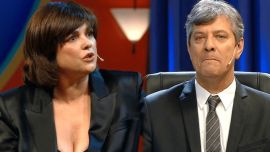Bulgarian economist Kristalina Georgieva secured the top job at the International Monetary Fund (IMF), continuing the tradition of a European holding the role while also becoming the first leader from an emerging market.
The former World Bank chief executive starts her five-year term as managing director on October 1, according to a statement released after the fund’s executive board voted Wednesday.
She succeeds Christine Lagarde, a former French finance minister who led the fund from 2011 and is the incoming European Central Bank president.
Georgieva said in brief remarks before reporters and staff at the IMF’s headquarters in Washington that her immediate priority is to help the fund’s 189 member nations minimise the risk of crises and cope with potential downturns. Without a doubt, Argentina will be high on the agenda.
“Warning signs are flashing, and we must be ready to be tested,” she said. “I assume my position fully aware of the challenges we face. Global economic growth continues to disappoint, trade tensions persist, and debt burdens are rising in many countries.”
Georgieva, 66, is the first person from an emerging market economy to lead the IMF since its inception in 1944, the Fund’s statement said.
Argentina crisis
Georgieva immediately confronts the economic crisis in Argentina, which last year negotiated the biggest loan in IMF history at US$56 billion in return for fiscal reforms.
The Fund is assessing Argentina’s new debt plan and considering whether to release the institution's next loan tranche. President Mauricio Macri plans to renegotiate debts – including with the IMF – among other measures. Lagarde told Bloomberg Television Tuesday that the fund “did the best we could at the time” in a very difficult situation.
The selection had been all but guaranteed after the global crisis lender said earlier this month that Georgieva, a former World Bank CEO, was the sole candidate.
Georgieva, who was championed by Paris, overcame a challenge within the divided European Union from Germany, which had backed former Dutch finance minister Jeroen Dijsselbloem.
French Finance Minister Bruno Le Maire tweeted his congratulations on Wednesday, saying the IMF will "thanks to your experience be able to fulfill its role in the world economy."
In a sign that Georgieva was indeed a shoo-in for the position, the fund this month formally lifted its age limit of 65 years for the leadership position, removing an obstacle that would have barred the 66-year-old.
Under an unwritten rule, a European has led the IMF since its creation in the aftermath of World War II while the leader of the fund's sister organisation, the World Bank, has been designated by Washington.
David Malpass, a former US Treasury official who took office earlier this year as president of the World Bank, likewise faced no opposition.
List of troubles
Georgieva also faces faltering global growth and concern of recessions in Germany and Italy as the US-China trade war weighs on businesses and financial markets. The uncertainty from Brexit is also adding to the worrying outlook for the world, which the IMF projects will grow by 3.2 percent this year, the weakest pace since the financial crisis. The Fund will release new projections next month at its annual meeting in Washington.
The IMF is also under pressure from the US, its biggest shareholder, to take a tougher line on China over the management of its currency. The Donald Trump administration in August formally designated China a currency manipulator after the yuan slipped through the symbolic seven-to-the-dollar level in response to the announcement of new US tariffs.
Georgieva, a former EU commissioner, has championed anti-poverty initiatives throughout her career. With the IMF under increasing pressure to soften its austerity demands on struggling borrowers, she may provide a more sympathetic ear. She was the only candidate put forward by the European Union.
Ashoka Mody, a former deputy director in the IMF’s Research and European Departments, said Georgieva’s impact may be limited as she isn’t seen as an economic heavyweight who commands respect from global policy makers like Lagarde and other predecessors. However, her background may help her add a “human dimension” to policy advice for nations recovering from economic crises, Mody said.
“If she’s able to use this opportunity to overcome that handicap by making the IMF a voice against unbridled financial interests and for a more just global economy, then she would have done herself a favour, and the institution too,” Mody said.
“Emerging market countries correctly say this is the first managing director from an emerging market,” IMF First Deputy Managing Director David Lipton, who assumed the chief’s role on an acting basis, said in a Bloomberg Radio interview Wednesday. “Her experience across emerging and developed economies in her work in Europe and at the World Bank, I think, gives her a huge reservoir of support from our membership.”
– TIMES/BLOOMBERG/AFP
























Comments